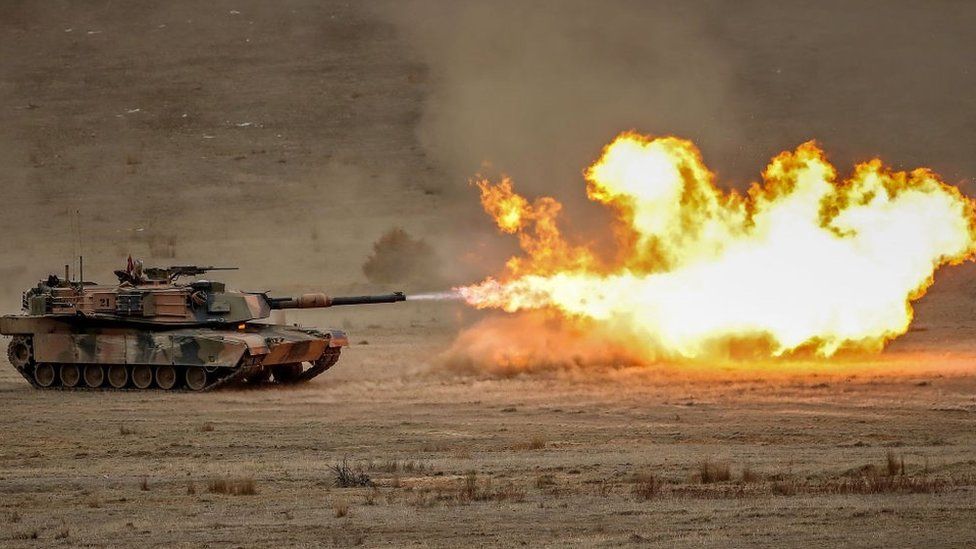Controversial Depleted Uranium Munitions Sent to Ukraine: A Deeper Look

Controversial Depleted Uranium Munitions Sent to Ukraine: A Deeper Look
In a significant development, the United States has opted to send a batch of depleted uranium munitions to Ukraine as part of a comprehensive aid package exceeding $1 billion. The aid package, unveiled on a Wednesday, includes 120mm rounds that can be utilized with the US-manufactured Abrams M1 tanks. These munitions are slated to reach Ukraine’s frontlines during the upcoming fall season, a move applauded by both Washington and Kyiv, as they anticipate bolstering Ukrainian forces in their relentless counteroffensive efforts.
However, the deployment of depleted uranium munitions has stirred up considerable controversy due to their mildly radioactive nature, igniting concerns about their safety and potential risks to civilians. This development has not only raised questions within the international community but has also prompted strong criticism from Moscow.
Depleted Uranium Munitions: The Basics
Depleted uranium (DU) munitions are a subset of armor-piercing projectiles used in military operations. The term “depleted uranium” refers to uranium that has undergone a process to reduce its proportion of the fissile isotope uranium-235, making it less radioactive than natural uranium. Depleted uranium munitions are favored for their exceptional density and penetrative capabilities, making them highly effective against armored targets such as tanks.
The controversy surrounding depleted uranium munitions stems from the fact that while they are less radioactive than natural uranium, they still emit low levels of radiation. When these munitions strike their targets, they can release a fine dust composed of depleted uranium particles. These particles, if inhaled or ingested, can pose potential health risks.

Why the US is Sending Depleted Uranium Munitions to Ukraine
The decision to send depleted uranium munitions to Ukraine comes at a critical juncture in the ongoing conflict in Eastern Ukraine. Ukrainian forces have been locked in a protracted struggle against Russian-backed separatists, and the aid package, including these munitions, is intended to bolster their capabilities. The 120mm rounds in question are designed for use with Abrams M1 tanks, which have proven to be a formidable asset on the battlefield. By supplying these munitions, the US aims to provide Ukrainian forces with the means to enhance their offensive capabilities and maintain the momentum they have gained in recent clashes.
Furthermore, the inclusion of depleted uranium munitions in the aid package signifies the seriousness with which the United States regards the situation in Ukraine. It underscores America’s commitment to supporting its ally in the face of external aggression and furthering its strategic interests in the region.
The Controversy Surrounding Depleted Uranium Munitions
The contentious aspect of sending depleted uranium munitions lies in the potential health and environmental hazards associated with their use. When DU munitions strike armored targets, they can release a fine dust composed of depleted uranium particles. These particles have been known to contaminate the surrounding area, posing potential risks to both military personnel and civilians.
Exposure to depleted uranium dust can result in a variety of health concerns. While the radiation emitted by DU is relatively low, prolonged or high-level exposure can still lead to increased cancer risks and potential damage to internal organs. Moreover, the dust itself can be inhaled or ingested, increasing the likelihood of health problems.
Environmental concerns also come into play. The long-lasting radioactive properties of DU can result in soil and water contamination, potentially impacting local ecosystems and communities. Addressing these environmental concerns can be a complex and costly endeavor.
International Concerns and Criticism from Moscow
The decision to send depleted uranium munitions to Ukraine has not gone unnoticed on the international stage. Several countries and organizations have expressed concerns about the potential risks associated with their use. Critics argue that the United States should prioritize non-radioactive alternatives in its military aid packages to avoid exacerbating health and environmental risks.
Among the most vocal critics of this move is Moscow. Russia has vehemently condemned the decision, characterizing it as a provocative act and accusing the US of endangering the lives of Ukrainian civilians. The Russian government has also asserted that the use of DU munitions could have dire consequences for the ongoing conflict, further complicating efforts to reach a peaceful resolution.

Addressing Safety Concerns
In response to the concerns raised, both the United States and Ukraine have emphasized their commitment to using depleted uranium munitions safely and responsibly. They have pledged to adhere to international guidelines and best practices for handling and disposing of DU munitions to minimize health and environmental risks.
Additionally, the Ukrainian government has stated that these munitions will be used primarily in combat zones, away from civilian populations, in an effort to reduce the likelihood of civilian exposure. Training and awareness programs will also be implemented for military personnel to ensure they understand the risks associated with DU munitions and take appropriate precautions.
The Broader Implications
The decision to send depleted uranium munitions to Ukraine highlights the complex nature of military aid and the intricate balance between providing support to allies and mitigating potential risks. While these munitions offer a significant tactical advantage on the battlefield, the concerns surrounding their use underscore the importance of transparency, responsible handling, and adherence to international norms.
The international community will be closely monitoring the situation in Ukraine, paying particular attention to how these munitions are employed and their impact on the region’s safety and stability. As the conflict continues to evolve, finding a resolution that addresses the legitimate security concerns of all parties while minimizing risks to civilians and the environment remains a pressing challenge.
In the coming months, it is expected that debates and discussions surrounding the use of depleted uranium munitions in Ukraine will persist, with both advocates and critics closely scrutinizing their impact on the ongoing conflict and the broader implications for international security and diplomacy. The balance between military effectiveness and responsible use of advanced weaponry will remain at the forefront of this ongoing debate.






